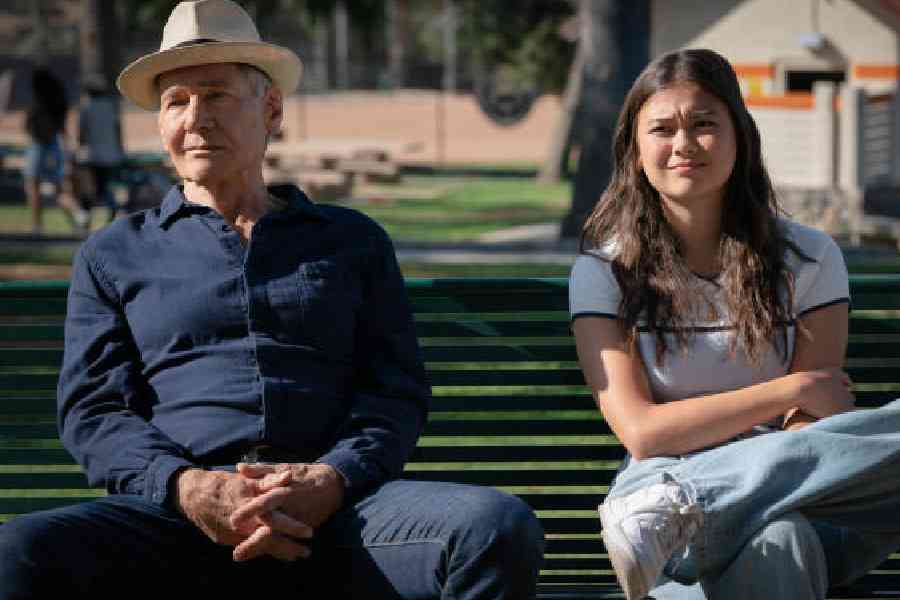For an actor, watching other actors break their moulds, defy stereotypes and come of age become sources of motivation and inspiration. That is a commonality between the shows I write about today. With Shogun, Hiroyuki Sanada, an actor unfairly known to international audiences for far too long as “that Japanese actor in Endgame or John Wick”, finally gets his chance to lead the cast of an international show, that too, a popular one with a humungous budget. Jason Segel, best known for his physical comedy, takes on darker afflictions of the human condition as a bereaved widower in Shrinking. Pedro Pascal, an actor who had already worked in Hollywood for close to two decades prior to Narcos but was mostly restricted to minor or secondary characters, finally wrapped his hands firmly around the much coveted “A-list status” with the success of The Last of Us. What certainly helped was that the shows themselves are cinematic marvels.
Shrinking
Shrinking is about dealing with loss and how it can change us. Jason Segel, who is also credited as one of the creators, plays Jimmy, a psychiatrist who is trying to cope with the loss of his wife. Grief-stricken, Jimmy has lost all sense of purpose and direction in life. His relationship with his daughter has become strained; he has cut himself off from his best friends and support system and most unexpectedly, and comically, he has become brutally honest with his patients.
He can no longer hold back his impulses to tell his patients exactly what he feels and breaks all codes and ethics of his profession by giving them the most unique and risky advice. The only moments of sunshine in his otherwise gloomy life are the rare moments of intervention from his senior, Paul (Harrison Ford) who cares deeply about Jimmy but is reluctant to show it. Paul himself is a bag of contradictions who is grasping at straws, trying to redeem himself and reconnect with his daughter and her family.
Although professionally he is looked up to and revered, Paul leads a lonely life, keeping most others at arm’s length, even the people he truly cares about.
Although Shrinking primarily deals with very dark subjects and some of the most serious issues of the human condition, it does so with a tone that is light overall and with heavy doses of humour. Yes, there are several moments throughout the show that will tug at your heartstrings and make your eyes well up, but for the most part, it stays true to its genre of comedy.
Bill Lawrence, one of the creators of the show, has always been known to take up particular walks of life, analyse it through a lens of comedy and yet tell stories that are so deeply rooted in the most common human emotions that his creations become relatable to everyone. He did the same thing with the now legendary medical comedy Scrubs and with the more recent sports comedy Ted Lasso. As for the acting on the show, it is top tier. Harrison Ford’s Paul is probably the most layered character on the show, also the one that goes through the most vividly visible metamorphosis.
The brilliance in Ford’s performance is how effortlessly he brings the contradictions of his arc to the fore. He makes Paul someone who has a commanding presence, someone whose affections and approval would mean a lot to those around him, yet he is vulnerable, and imperfect. He is just as lonely as those he mocks for seeking validation. Segel, who is best known for Forgetting Sarah Marshall and How I Met Your Mother, has rarely strayed too far from playing the goofball or the slacker. He doesn’t here either, however, his performance never lacks conviction and never fails to make you empathise with Jimmy, guiding the audience towards a bittersweet catharsis with absolute mastery. The rest of the cast also consists of popular and familiar names and though all of them are brilliant, Christa Miller, Heidi Gardner and Michael Urie stand out. The hero of the show though is the writing, as it is with all of Bill Lawrence’s shows.
Where to watch: Apple TV
SHOGUN
At various points in the history of our species, Japan has been viewed as the pinnacle of human civilisation. Simultaneously, even with its history of living by the Samurai principles of honour, duty, discipline and sacrifice, Japanese civilisation has also been marred by feudal in-fighting and civil wars. Shogun, an adaptation of James Clavell’s 1975 bestseller that some have claimed very loosely mirrors actual historical events of the time, explores one such era in the 1600s. At its core, the show is about a sailor, John Blackthorne, who finds himself in the strange lands of Japan in times that are stranger still.
The long-reigning and revered ruler of the lands has recently passed away, leaving behind an heir who is still too young to govern. Before his demise, he had formed a council of lords who were to protect the heir apparent and also the best interests of the country. However, with the arrival of Portuguese colonialists and their subsequent attempts at establishing trade and spreading the Catholic religion, equations have started to change.
Lord Yoshii Toranaga, one of the most trusted, loyal and seemingly honourable servants of the ruler, has now been outnumbered as the four other lords have unified against him with intentions of becoming the ultimate authorities of the land themselves. As the power struggle starts to intensify and Lord Toranaga’s exile or execution starts becoming an absolute certainty, hope arrives in the form of a marooned ship that carries precious cargo, arms, ammunition and the pilot of the ship — John Blackthorne.
On one hand, John Blackthorne finds himself at odds with the cultures of the island nation whose shores his ship has been marooned on, on the other he finds himself at the centre of a deadly conflict that may eventually lead to civil war. Shogun is a deep-dive into the world of brutal politics, power-mongering, and colonialism while simultaneously exploring the legendary ways of the Samurai, all seen through the eyes of a European, whose belief that human civilisation peaked on the lands that he hails from has been shaken as he starts realising that perhaps the rest of the world is not as savage as he had presumed.
Armed with a humungous budget, FX did a brilliant job at bringing the Japan of the early 17th century to life. The costumes, settings, acting, cinematography and writing are all top-notch. Cosmo Jarvis as John Blackthorne, Hiroyuki Sanada as Lord Toranaga and Anna Sawai as Mariko set the bar for acting performances very high but the rest of the cast are not far behind. Fair warning though, the show is strictly for mature audiences and definitely not for the faint of heart. Also, it’s mostly in Japanese so expect to depend largely on subtitles.
Where to watch: Hotstar
THE LAST OF US

The Last of Us was a highly-anticipated show for all the right reasons. As a gamer myself, I can cite several examples of hugely popular video game IPs that fell face first into obscurity when they were adapted for screen — Hitman, Assassins Creed, Max Payne or the hugely popular Uncharted series, but The Last of Us was being adapted for screen by HBO, a stable with a near-impeccable track record. Furthermore, it had Craig Mazin attached as a creator, the man who gave us Chernobyl, another brilliant show made for HBO.
Pedro Pascal, a man with the Midas touch in recent times, had been trusted with the responsibility of playing Joel, the protagonist of the first game and the first season of the series, further adding to the hype. More than anything else though, the fan community of this game had always been aware that it would get adapted for screen sooner or later because even though at face value it is a dystopian, zombie survivalist, third-person action-adventure game, the heart of the game lies in the brilliant writing.
The story of the game was absolutely brilliant — before the outbreak turned the entire world upside down and wiped out 90 per cent of the human population, Joel was living a simple life with his daughter. When the outbreak finally reaches his small town, he tries to make an escape from the quarantine zone with his brother and daughter. Unfortunately, his daughter gets killed during the escape attempt. Years later, Joel lives in one of the last human settlements with military governance, as a smuggler, even though he has lost any sense of purpose and the will to live.
He reluctantly takes on the responsibility of transporting a young girl, Ellie, from the closed-off settlement to another part of the country. The Fireflies, the underground organisation that hands him this responsibility does not reveal to him what is so special about this girl and why they believe that the very survival of the species rests on her fate. Initially, Joel sees Ellie as little more than cargo, but throughout their perilous journey across dystopian America, Joel and Ellie start to bond, eventually culminating in a father-daughter relationship and a second chance at life for Joel, with a newfound purpose.
The show remains largely faithful to the source material, taking liberties only to elaborate on the source of the outbreak, how the infected are controlled by the infecting fungi and how the outbreak eventually undid human civilisation. Pedro Pascal is brilliant as usual, Bella Ramsey makes the perfect Ellie and the show’s depiction of dystopian America is absolutely brilliant. If you are one of the many who dismissed the show as just another video game adaptation that aims to grab cash by targeting the gaming community, you have missed out on one of the finest shows we’ve had in recent times. With the second season coming next year, which adapts the second instalment of the game, this might be a good time to binge-watch The Last of Us.
Where to watch: Jio Cinema










